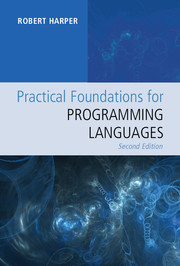Book contents
- Frontmatter
- Contents
- Preface to the Second Edition
- Preface to the First Edition
- Part I Judgments and Rules
- Part II Statics and Dynamics
- Part III Total Functions
- Part IV Finite Data Types
- Part V Types and Propositions
- 12 Constructive Logic
- 13 Classical Logic
- Part VI Infinite Data Types
- Part VII Variable Types
- Part VIII Partiality and Recursive Types
- Part IX Dynamic Types
- Part X Subtyping
- Part XI Dynamic Dispatch
- Part XII Control Flow
- Part XIII Symbolic Data
- Part XIV Mutable State
- Part XV Parallelism
- Part XVI Concurrency and Distribution
- Part XVII Modularity
- Part XVIII Equational Reasoning
- Part XIX Appendices
- References
- Index
13 - Classical Logic
from Part V - Types and Propositions
Published online by Cambridge University Press: 05 March 2016
- Frontmatter
- Contents
- Preface to the Second Edition
- Preface to the First Edition
- Part I Judgments and Rules
- Part II Statics and Dynamics
- Part III Total Functions
- Part IV Finite Data Types
- Part V Types and Propositions
- 12 Constructive Logic
- 13 Classical Logic
- Part VI Infinite Data Types
- Part VII Variable Types
- Part VIII Partiality and Recursive Types
- Part IX Dynamic Types
- Part X Subtyping
- Part XI Dynamic Dispatch
- Part XII Control Flow
- Part XIII Symbolic Data
- Part XIV Mutable State
- Part XV Parallelism
- Part XVI Concurrency and Distribution
- Part XVII Modularity
- Part XVIII Equational Reasoning
- Part XIX Appendices
- References
- Index
Summary
In constructive logic, a proposition is true exactly when it has a proof, a derivation of it from axioms and assumptions, and is false exactly when it has a refutation, a derivation of a contradiction from the assumption that it is true. Constructive logic is a logic of positive evidence. To affirm or deny a proposition requires a proof, either of the proposition itself, or of a contradiction, under the assumption that it has a proof. We are not always able to affirm or deny a proposition. An open problem is one for which we have neither a proof nor a refutation—constructively speaking, it is neither true nor false.
In contrast, classical logic (the one we learned in school) is a logic of perfect information where every proposition is either true or false.We may say that classical logic corresponds to “god's view” of the world—there are no open problems, rather all propositions are either true or false. Put another way, to assert that every proposition is either true or false is to weaken the notion of truth to encompass all that is not false, dually to the constructively (and classically) valid interpretation of falsity as all that is not true. The symmetry between truth and falsity is appealing, but there is a price to pay for this: the meanings of the logical connectives are weaker in the classical case than in the constructive.
The law of the excluded middle provides a prime example. Constructively, this principle is not universally valid, as we have seen in Exercise 12.1. Classically, however, it is valid, because every proposition is either false or not false, and being not false is the same as being true. Nevertheless, classical logic is consistent with constructive logic in that constructive logic does not refute classical logic. As we have seen, constructive logic proves that the law of the excluded middle is positively not refuted (its double negation is constructively true). Consequently, constructive logic is stronger (more expressive) than classical logic, because it can express more distinctions (namely, between affirmation and irrefutability), and because it is consistent with classical logic.
Proofs in constructive logic have computational content: they can be executed as programs, and their behavior is described by their type. Proofs in classical logic also have computational content, but in a weaker sense than in constructive logic.
- Type
- Chapter
- Information
- Practical Foundations for Programming Languages , pp. 104 - 116Publisher: Cambridge University PressPrint publication year: 2016



